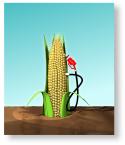
Regardless of race, sexual orientation, origin or political affiliation, there is one thing students and faculty at Iowa State can agree on: The state of Iowa has corn — and lots of it. In addition to Iowa being known as the Hawkeye State, after the Sauk Indian Black Hawk, the state of Iowa is also known widely as the “Corn State” for its leadership in corn production.
The corn grown in Iowa goes into food productions, cattle feed and ethanol. Ethanol is a fuel that is produced from corn and other crops and has been implemented into the American gasoline industry. The most a typical car can fuel on is a mere 10 percent ethanol, with ethanol cars having to be built to specifically run on 100 percent ethanol.
Advent of a new fuel seems wonderful, especially with the rising gas prices in the U.S., but what most Iowans do not realize is that in some parts of the U.S., the use of ethanol as a fuel source is controversial. Specifically, the state of California outright refuses to use corn-based ethanol, with outspoken critics blaming ethanol for the deforestation of the rain forest and world hunger.
In his book “Why Are We Producing Biofuels?,” Robert Brown, director of Iowa State’s Bioeconomy Institute and professor of chemical and biological engineering, shows that the level of exports to less-developed countries is actually slightly increasing while the amount of corn going to livestock remains about the same.